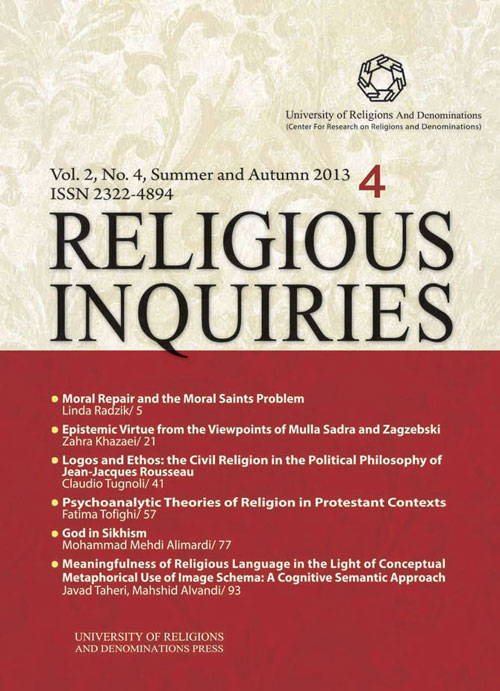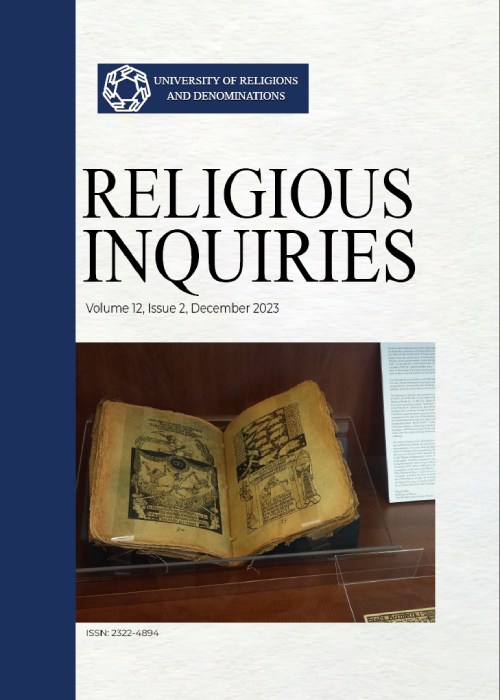فهرست مطالب

Religious Inquiries
Volume:2 Issue: 2, Summer and Autumn 2013
- تاریخ انتشار: 1395/02/18
- تعداد عناوین: 6
-
-
Pages 5-19This article explores the forms of moral repair that the wrongdoer has to perform in an attempt to make amends for her past wrongdoing, with a focus on the issues of interpersonal moral repair; that is, what a wrongdoer can do to merit her victims forgiveness and achieve reconciliation with her community. The article argues against the very general demands of atonement that amount to an obligation to stop being someone who commits wrongsto become a ―moral saint‖and suggests a new form of atonement that is more practical and useful in our everyday life.Keywords: Moral repair, moral saints, forgiveness, atonement
-
Pages 21-39This paper compares epistemic virtue from the viewpoints of Zagzebski and Mulla Sadra, aiming to determine the extent to which their viewpoints on epistemic virtue are similar. Zagzebski, the contemporary philosopher, considers epistemic virtue as the basis on which knowledge is interpreted. She sees epistemic virtue as a requirement for achieving knowledge. Mulla Sadra, the founder of Transcendent Philosophy, considers knowledge as an outcome of intellectual virtues without which there would be no knowledge. The role these two philosophers ascribe to moral and intellectual virtues and vices in forming the identity makes it possible to compare their interpretation of epistemic virtues. As a virtue responsibilist, Zagzebski sees epistemic virtue as a character trait and explains its nature by its different components. Sadra as well, sees epistemic virtue as a character trait. Evidence shows that Sadras definition of intellectual virtues is similar to that given by Zagzebski in many respects. Examining Zagzebskis viewpoint on epistemic virtue, this paper will discuss Sadras viewpoint on epistemic virtue as well as its contribution to knowledge. In conclusion the similarities of the two viewpoints will be delineated.Keywords: Epistemic Virtue, Knowledge, Zagzebski, Mulla Sadra
-
Pages 41-55This article explores the concept of civil religion from the perspective of Jean-Jacques Rousseau. It starts with a discussion of the essence of sovereignty as the implementation of general will, which, the author explains, is manifested in the obedience of the laws. The article then discusses the way in which, in Rousseaus view, institutional mechanisms work and thereupon explores how he envisaged the role of religion in the constitution of states and concludes with explaining the meaning of civil religion in his thought.Keywords: civil religion, Jean, Jacques Rousseau, sovereignty, general will
-
Pages 57-75Psychoanalysts since Sigmund Freud have tried to discuss the role of religion in modern societies. Freud himself saw religion as an illusion which had struck neurotics, while Slavoj Žižek viewed it as some sort of perversion which functioned in the cycle of law-transgression. In this essay, I dig into these theories to uncover traces of Lutheran interpretations of Pauls words on the Jewish law. I argue that Luthers emphasis on Christian faith as a remedy for Jewish guilt reached Friedrich Nietzsche via the exegesis of the nineteenth-century Tübingen School. In his Pauline act, Nietzsche tried to cure modern humanity from its guilt-inducing decadent morality. He, in turn, influenced Freud, who sought to remedy modern humanity from its guilt, by reminding it of its religious illusion. Žižek has not been able to go beyond this paradigm of faith-guilt, as he also tried to free Christianity from its perverse core. In sum, in its conceptualization of religion, psychoanalysis has probably referred to a Protestant faith-guilt framework.Keywords: Psychoanalytic theories of religion, Sigmund Freud, Slavoj Žižek, Lutheran interpretation, St Paul
-
Pages 77-92The fundamental belief in Sikhism is that God exists not merely as an idea or concept, but as a real entity. God is indescribable, yet knowable and perceivable to anyone who is prepared to dedicate the time and energy to become perceptive to His persona. The Gurus never spoke about proofs of the existence of God. For them, He is too real, and something obvious does not require any logical proof. God is transcendent and all-pervasive at the same time. Transcendence and immanence are two aspects of the same single Supreme Reality. The Reality is imminent in the entire creation, but the creation as a whole fails to contain God in its entirety. We will describe the Reality within Sikhism, and explain how it parallels to Islam or Hinduism.Keywords: Sikhism, God, Onkār, unity
-
Pages 93-103According to modern religious studies, religions are rooted in certain metaphorical representations, so they are metaphorical in nature. This article aims to show, first, how conceptual metaphors employ image schemas to make our language meaningful, and then to assert that image-schematic structure of religious expressions, by which religious metaphors conceptualize abstract meanings, is the basis of meaningfulness of religious language. Authors benefit from cognitive theories of some eminent semanticists, such as Mark Johnson, Jean Mandler, George Lakoff, et al., on metaphors. There are, as described by cognitive semantics, many preconceptual patterns that constitute a network of meaningful image-schemata upon which our primary knowledge is grounded. It is argued that image-schemata are inherently meaningful, and conceptual metaphors by using these image-schemata transmit the meaningfulness to the religious representations.Keywords: cognitive semantics, Image Schema, conceptual metaphor, meaningfulness of religious language


